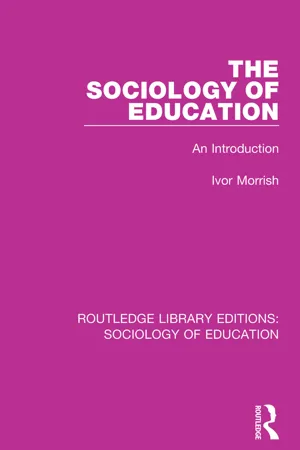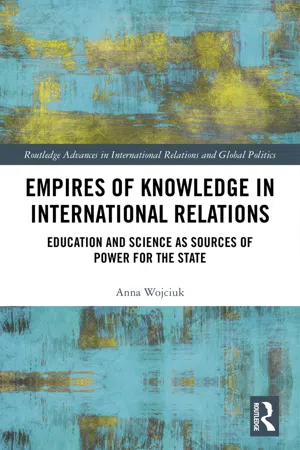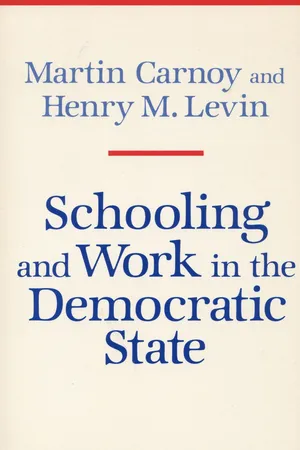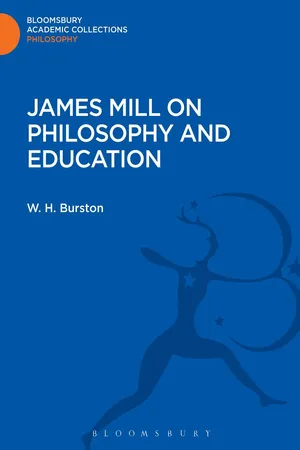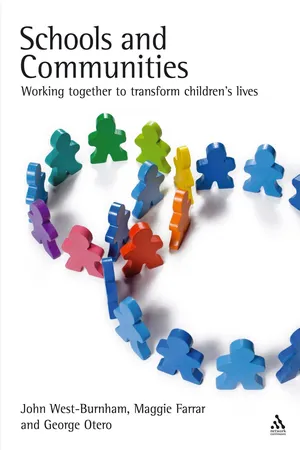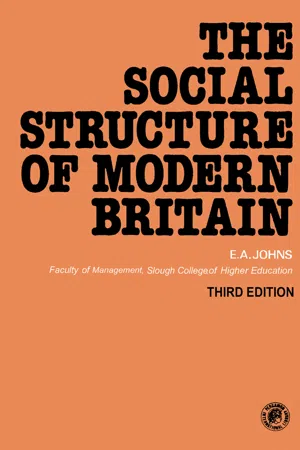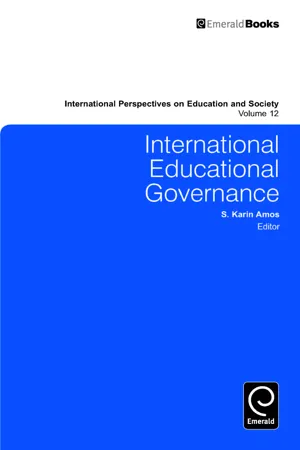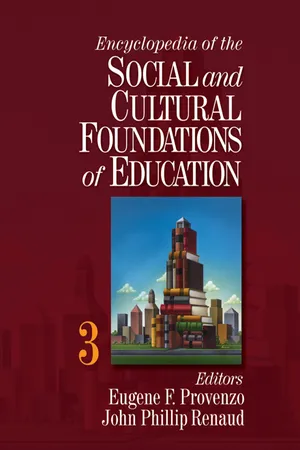Social Sciences
Education and the State
Education and the State refers to the relationship between government and the education system. It encompasses the state's role in funding, regulating, and shaping educational policies and practices. This interaction has significant implications for the quality, accessibility, and equity of education within a society.
Written by Perlego with AI-assistance
Related key terms
1 of 5
9 Key excerpts on "Education and the State"
- eBook - ePub
The Sociology of Education
An Introduction
- Ivor Morrish(Author)
- 2019(Publication Date)
- Routledge(Publisher)
Chapter 5 The State, Politics and EducationA. The Role of the State in Education
'Order is the first requirement of the diverse, specialized, interdependent activity of modern man, and this order the state alone can maintain' (1) .It is obvious that whether we are considering a primitive group or a complex, sophisticated society we are vitally concerned with the problem of order. In a simple society power may reside in the person of a tribal chief or in a group of headmen; in a highly developed society it may reside in what is referred to as 'the state'. In broad, general terms, a state is an association of people, a specific organization of society which is responsible for performing political functions, and which possesses the ultimate power of coercion and sanction. In their introductory work, Society , Maclver and Page go on to emphasize not merely the importance of order within the micro-society, but also the necessity of order within the macro-society of the world, that is, the necessity of some form of international order.Without such 'state' order and regulation it is impossible for a society to make any concerted effort at progress. This applies equally within the realm of education, to which no state can be indifferent since, as Durkheim emphasizes, education is basically and essentially a social function (2) . Yet, despite his insistence that everything which in any way pertains to education 'must in some degree be submitted to [the state's] influence' (3) , Durkheim was very liberal in his views about the existence of schools other than those for which the state was directly responsible. The state must, in the interests of the public, allow other schools to be opened, but in so doing must not remain aloof from what is going on in them. On the contrary,' argues Durkheim, 'the education given in them must remain under its control' (4) . The 1944 Education Act made it quite clear that the state regarded it as part of its function to keep a register of independent schools and to inspect such schools as it saw fit (5) - eBook - ePub
Empires of Knowledge in International Relations
Education and Science as Sources of Power for the State
- Anna Wojciuk(Author)
- 2018(Publication Date)
- Routledge(Publisher)
Left-leaning thinkers, in turn, highlight the persistence of social inequalities, particularly in terms of economic and cultural capital. In their view, an individual’s causative powers are far more constrained than the liberals believe them to be, and the future success or failure, rather than being a correlative of individual effort, depends strictly on the context of a person’s development. They stress the role education may play in the reproduction of social inequality, consider the different patterns by which the latter is inherited, and highlight the disparity in educational opportunities from the perspective of the organisation of school systems. In this context, though thinkers of a social-democratic persuasion tend more towards a defence of the state as a potential means to social justice through equating opportunities and establishing school systems geared towards fighting inherited inequalities, Marxist currents firmly stress that institutions of the nation-state are themselves inevitably embroiled in supporting the dominant classes. From this perspective, state education systems become a tool for symbolic, and at times even literal, social control. Leftist thinkers and scholars uncover the social conflict, fought primarily along the lines of social distinctions, within extant institutions and rules of the game, including those by which the state itself is governed. Subsumed under the state, education loses its emancipatory potential; thus, the proponents of these currents advocate resistance against the nation-state’s monopoly on intervention in education as well as engagement in efforts to establish alternative schools teaching subsequent generations to think critically on the current socio-economic situation.Émile Durkheim (1926) proposed one of the first sociological theories of the function of education in state-building processes. In his view, education had played a crucial part in societies even before the emergence of the modern state, and its guiding idea evolved through time. After all, it is society that defines its ideal of humanity, its intellectual, moral, and physical contours. To an extent, this ideal applies to all citizen: education plays a crucial part in forming homogeneous societies by disseminating supra-individual norms, rules, duties, and ways of acting. In Durkheim’s opinion, society cannot exist without a minimal degree of cohesion. Education contributes to the formation of this homogeneity and reinforces it by imposing similarities among the youth from the very beginning (Durkheim 1926: 119). It fosters social integration through cultural transmission and imposes norms without which social cohesion is unattainable. This new form of integration emerged in the wake of the dissolution of traditional communities, the weakening of ties of tradition and morality. Meanwhile, the state took on the task of strengthening new identifications. Though the creation of the community of ideas and sentiments binding the members of societies to the new political entity was not its achievement, in effect it consecrated and maintained that community after the fact. The state became involved in the transmission of the values of modernisation to individuals and in the establishment of a sense of belonging to new, large social groups, attached directly to the state. Education’s key function was thus the methodical socialisation of the young generation by its adult counterparts. - eBook - ePub
- Martin Carnoy, Henry Levin(Authors)
- 1985(Publication Date)
- Stanford University Press(Publisher)
2
Education and Theories of the State
Explicit theories of the State—explanations of how political men and women interact, individually and collectively—are lacking from most educational writing, even though public education is primarily a State function and the State has become an increasingly significant part of the production system. Such theories are the basis for understanding the role of all institutions in a society and their interrelation, including the role of education and its relation to society at large. The public sector in the United States now directly controls more than one-third of the national product, one-sixth of all jobs, and one-third of the jobs held by college graduates (Carnoy, Shearer & Rumberger 1983: Chap. 6). This massive participation is not an accident, nor is it the result of an insatiable bureaucracy. Increased State intervention, we suggest, is a product of social conflict.The present array of social welfare spending, for example, is largely the result of State responses to potential conflict during the economic crisis of the 1930’s. There has been a shift of resources from the private sector to the State, which moves conflict away from private production and into the State itself. It is no accident that the civil rights movement, the women’s movement, and the antinuclear movement—to take three prime examples of the past quarter century—have focused their activities on changing the State’s position toward minorities, women, and military spending, respectively. Even the American labor movement has grown in the last thirty years primarily through organizing public-sector unions.Education, as part of the functions of the State, is also an arena of social conflict. If the State in capitalist democracies is viewed as responsible for providing justice and equity to compensate for inequalities arising out of the social and economic system, education’s role then is seen as improving the social position of have-not groups by making relevant knowledge and certification for participation available to them. At the same time, the capitalist State and its educational system must, by their very nature, reproduce capitalist relations of production, including the division of labor and the class relations that are part of that division. The tension between reproducing inequality and producing greater equality is inherent in public schooling, just as social tension is inherent in all institutions structured according to class, race, and gender. The basis of this tension is not ideology as such, but ideology as it relates to the concrete reality of social position, material wealth, and political power. - Anna Wojciuk(Author)
- 2018(Publication Date)
- Routledge(Publisher)
Émile Durkheim (1926) proposed one of the first sociological theories of the function of education in state-building processes. In his view, education had played a crucial part in societies even before the emergence of the modern state, and its guiding idea evolved through time. After all, it is society that defines its ideal of humanity, its intellectual, moral, and physical contours. To an extent, this ideal applies to all citizen: education plays a crucial part in forming homo-geneous societies by disseminating supra-individual norms, rules, duties, and ways of acting. In Durkheim s opinion, society cannot exist without a minimal Education and the State-building process 35 degree of cohesion. Education contributes to the formation of this homogeneity and reinforces it by imposing similarities among the youth from the very begin-ning (Durkheim 1926: 119). It fosters social integration through cultural trans -mission and imposes norms without which social cohesion is unattainable. This new form of integration emerged in the wake of the dissolution of traditional communities, the weakening of ties of tradition and morality. Meanwhile, the state took on the task of strengthening new identifications. Though the creation of the community of ideas and sentiments binding the members of societies to the new political entity was not its achievement, in effect it consecrated and maintained that community after the fact. The state became involved in the trans-mission of the values of modernisation to individuals and in the establishment of a sense of belonging to new, large social groups, attached directly to the state. Education s key function was thus the methodical socialisation of the young generation by its adult counterparts. On the other hand, the French sociologist also noted the need for individuality and diversity without which the potential of cooperation that binds the society together would not be fulfilled.- eBook - PDF
- W. H. Burston(Author)
- 2013(Publication Date)
- Bloomsbury Academic(Publisher)
If this alone is meant by education, it is no doubt true that education is very far indeed from being all-powerful. But if in education is included everything, which acts upon the being as it comes from the hand of nature, in such a manner as 1 Essay on Education, op. cit., pp. 41-2. POLITICAL AND SOCIAL EDUCATION 199 to modify the mind, to render the train of feelings different from what it would otherwise have been; the question is worthy of the most profound consideration.' 2 Mill does not commit himself to Helvetius' famous assertion: 'L'education peut tout', but he does say, on empirical grounds: 'This much, at any rate, is ascertained, that all the difference which exists, or can be made to exist, between one class of men, and another, is wholly owing to education.' 3 This definition enabled Mill to include under the term 'educa-tion' the influence of the family, both before and during school-days: this he entitled Domestic Education. More important from the point of view of this chapter is that he also extended the term education to apply after school-days, and throughout life and therefore arrived at concepts of Social and Political Education, or the influence of Society and of the State upon our characters and abilities. 'Social Education', says Mill, 'is that in which Society is the Institutor. That the Society in which an individual moves pro-duces great effects upon his mode of thinking and acting, every-body knows by indubitable experience. The object is, to ascer-tain the extent of this influence, the mode in which it is brought about, and hence the means of making it operate in a good, rather than an evil direction. 'The force of this influence springs from two sources: the principle of imitation; and the power of the society over our happiness and misery.' 4 The first of these is due to association and the frequency with which we are in the society of our personal group or groups. - eBook - PDF
Schools and Communities
Working together to transform children's lives
- John West-Burnham, Maggie Farrar, George Otero(Authors)
- 2007(Publication Date)
- Network Continuum Education(Publisher)
(Interestingly they are often in the same countries.) Education is a social activity defined by personal and social choices - it is therefore a moral activity. One of the problems of British education is that it is deeply rooted in a moral framework that is the antithesis to any notion of equity or democracy. The malevolent influence of Plato continues to dominate much of educational thinking however subliminal or massaged it may be. The idea of the gold standard, the justification of a stratified society and the control and censorship of education can all be directly attributed to Plato. Those who argue for the incompatibility of excellence 3 and equity are essentially perpetuating Plato's elitist and anti-democratic ideology. This chapter seeks to make the case for equity and social justice in education to underpin the case presented in Chapters 1 and 2. This chapter will therefore explore the following themes: • Comparing and contrasting education and schooling • The purpose of education • Childhood • Children's rights • Every Child Matters. Comparing and contrasting education and schooling 'When I use a word/ Humpty Dumpty said in a rather scornful tone, 'it means just what I choose it to mean -neither more nor less.' (Carroll, 1872, page 59) One of the key problems in approaching this topic is that education and schooling are frequently used interchangeably, if not as actual synonyms. However, it quickly becomes apparent that the Department for Education is in fact concerned with institutions, content and outcomes, and that the mantra 'education, education, education' in fact means 'schools, schools, schools'. For the purposes of this discussion, schooling is defined as the formalized, commodified and bureaucratized component of education; in essence: Schooling is a necessary but not sufficient component of education. During the period of compulsory schooling, children and young people spend about 15 per cent of their life in schools. - eBook - PDF
The Social Structure of Modern Britain
Pergamon International Library of Science, Technology, Engineering and Social Studies
- E. A. Johns(Author)
- 2016(Publication Date)
- Pergamon(Publisher)
T h u s the authors of Social Scientists at Work 25 conclude: W e have shown that possession of a social science degree entailed average earnings higher t h a n those for graduates as a whole d u r i n g the 1960s a n d we have suggested that this m a y h a v e accounted at least in p a r t for the rapid growth in the n u m b e r of social science students d u r i n g that d e c a d e . A r m e d with such assumptions, the study predicts that the proportion of sociologists will fall d u r i n g the next few years, followed to a certain extent by the n u m b e r of psychologists ; business studies courses will r e m a i n p o p u l a r ; the expansion of economics will continue ; a n d the decline in geography is perennial. 25 Williams, G., Westoby, A. and Webster, D., Social Scientists at Work, Society for Research into Higher Education, 1976. The Socialization Process : Education 167 Education and Society Socialization is a process of cultural transmission w h e r e b y people learn the rules, practices a n d n o r m s of the social groups to which they belong. F o r m a l education is only one of the m a n y a g e n c i e s 26 through which the socialization process is enacted, b u t it is particularly crucial in a d v a n c e d industrial societies because of the a m o u n t of time it occu-pies d u r i n g the individual's formative years. As education proceeds, a n d prolongs itself by the development of extensions to the system beyond the m i n i m u m leaving age, it produces recruits for the specialized roles required b y industrialization. Equally, education communicates in-formal values which are eventually internalized by the recipient, on aspects of behaviour concerned with occupational a d v a n c e m e n t , honesty, individual competitiveness a n d others. - eBook - PDF
- S. Karin Amos, Alexander W. Wiseman(Authors)
- 2010(Publication Date)
- Emerald Group Publishing Limited(Publisher)
While rejecting a deterministic view of technology, Foucault strongly emphasizes the role of technologies in giving meaning and stability to institutions. Finally, there is the dimension of the state as effect, instrument, and field of political strategies. State action is an effect of strategies, because it cannot be attributed to a single and coherent actor, but is the result of conflicting and competing governance practices. Bob Jessop concurs with this perspective by equally stressing the relational and therefore provisional character of ‘‘state projects’’ ( Jessop, 1990 ). Situating the state in a web of governance relations does not relegate the state to a secondary category. Much to the contrary, the state takes a strategic position within societal relations. The state is also an instrument of strategic acting in that it is implicated in creating a liminal territory where fundamental distinctions come into play (e.g., citizen and foreigner, private and public), where decisions are made over who is protected by the state and who is not, the conditions of access to public resources, and so forth. The state is also The Morphodynamics of Modern Education Systems 89 a field privileging some actors while ignoring others, providing some with organizational infrastructures, but not others. The general perspective of this is close to the neo-institutional notion of the top-down constitution of modern actors: states, organizations, and individuals. The actors are constituted by their following universalized models, not by self-creation. The modern individual is a societal phenomenon, not a subjective one. Education and the State: CHARACTERISTICS OF A MODERN RELATION What does the nexus outlined above mean more specifically? In particular with regard to the modern state as a nation-state, there is a very important, not to say central, relation between the pedagogical and the political, which is assimilating individuals to the nation as an ethnic community. - Eugene F. Provenzo, Jr., Eugene F. Provenzo(Authors)
- 2008(Publication Date)
- SAGE Publications, Inc(Publisher)
Throughout the second half of this essay, I call for a renewed definition of the social foundations of education. In doing so, the integration of insights from the field of cultural studies can pro-vide the basis for a new approach to the field. It can not only respect disciplinary insights and methods, but also be linked in a dynamic and meaningful way to the original founding principles of the social foundations of education. Undertaking a discussion of cultural studies and its relationship to the social foundations of education requires an examination of the meaning of the term culture. In its most conservative meaning, culture can be defined as a “standard of aesthetic excellence,” 76 what the nineteenth-century English critic Matthew Arnold defined as “the best that has been said and thought in the world.” 77 For the poet T. S. Eliot, culture represented “all the characteristic activities and inter-ests of a people.” 78 In the United States, this definition could include New Orleans jazz, the poetry of Robert Frost, the music of Elvis Presley, the design of the Empire State Building, a McDonald’s hamburger, or the New York Philharmonic. The anthropologist Edward T. Hall describes culture in the following way: Culture is man’s medium; there is not one aspect of human life that is not touched and altered by culture. This means personality, how people express them-selves (including shows of emotion), the way they 982 ——— Encyclopedia of the Social and Cultural Foundations of Education think, how they move, how problems are served, how their cities are planned and laid out, how transporta-tion systems function and are organized, as well as how economic and government systems are put together and function. 79 However, it is frequently the most obvious and taken-for-granted, and therefore the least studied, aspects of culture that influence behavior in the deepest and most subtle ways.
Index pages curate the most relevant extracts from our library of academic textbooks. They’ve been created using an in-house natural language model (NLM), each adding context and meaning to key research topics.
